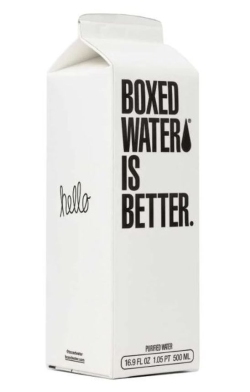- with readers working within the Consumer Industries industries
- within Cannabis & Hemp topic(s)
The International Bottled Water Association brought a challenge to the National Advertising Division, alleging that Boxed Water is Better was making false claims about the environmental benefits of its boxed water. The IBWA challenged a wide variety of claims made by the advertiser, including that its cartons are recyclable and renewable and that they are just "better."
Without up-to-date guidance from the Federal Trade Commission about how to make environmental marketing claims, it's not easy right now for advertisers to navigate these issues. The truth is, it's also not that easy for self-regulation to sort out these issues either. In this case, the NAD tackled a number of difficult, emerging issues. Here's what happened.
Recyclable Claims
Boxed Water is Better advertised that its cartons are "recyclable" and "100% recyclable." In support of its claims, the advertiser presented evidence – consistent with the requirements in the FTC's (now pretty out-of-date) Green Guides – that 62% of households and communities in the United States have access to recycling centers that accept cartons.
The challenger argued that the claim was misleading, however, because even if facilities accepted the cartons for recycling, they may not ultimately recycle them due to the fact that some facilities are not able to separate the aluminum, plastic, and fiber layers that make up the carton.
The NAD held, however, that the claim was substantiated – in light of the fact that the advertiser had substantiation that at least 60% of consumers had access to recycling facilities and the fact that the boxes were capable of being recycled. The NAD explained, "Neither the Green Guides nor the plain English reading of the claim requires that recycling facilities actually recycle the entire product."
The NAD is not breaking any new ground here. Although the FTC held a workshop back in 2023 that explored this issue, it seems that, at least for now, so long as recycling facilities accept the materials for recycling, advertisers aren't responsible for what happens after that.
Renewable Claims
Boxed Water is Better also made a variety of claims that its cartons are renewable, including, for example, "the most renewable option in the water aisle" and "92% renewable materials." In support of its claims, the advertiser submitted evidence that 96% of the carton is made of plant-based material that is, in fact, renewable.
The challenger questioned, however, whether the carton's liner film and cap – which make up more than a third of the total packaging – are made of renewable plastic.
The advertiser explained that both the liner film and the cap are 100% plant-based as determined through a mass balance accounting approach. In other words, although the amount of renewable plastic purchased accounts for 100% of the plastic used in the cartons, the amount of renewable plastic actually used in any individual carton may vary.
Although the NAD acknowledged that the advertiser purchased renewable materials equivalent to using 92% renewable material in the packaging, the NAD was concerned that consumers may not understand that – because the mass balancing approach – any individual carton may not actually be made up of 92% renewable material.
The NAD also didn't think that the advertisers unqualified "renewable" packaging claims were substantiated as well, in light of the fact that the carton was not made of entirely renewable materials. The NAD explained, "the aluminum used in the carton is neither a renewable resource nor a minor or incidental component of the carton."
In addition, the NAD also said that the advertiser's comparative claim – "the most renewable option in the water aisle" – should also be discontinued, in light of the fact that Boxed Water is Better didn't submit testing in support of its claim against at least 85% of the market.
The big news here is that the NAD didn't accept mass balance accounting as substantiation for the "92% renewable materials" claim – although it appears that the Green Guides would have been much more open to this. Does this signal that self-regulation may be taking a more restrictive view on environmental marketing claims than the FTC?
General Environmental Benefit Claims
The IBWA also challenged a variety of general environmental benefit claims made by the advertiser, including, for example, "the earth loves our box," "better for the planet," "sustainable," and "helping the planet heal one carton at a time."
The NAD wasn't troubled by these claims, holding that they were surrounded by statements qualifying and limiting the claims. For example, the NAD pointed to the fact that "better for the planet" is immediately followed by a short paragraph explaining the potential issues with plastic packaging and proposing its own renewable packaged option instead.
Interestingly, the NAD also thought that claims on the advertiser's website, such as "sustainable" and "helping the planet heal, one carton at a time," were also not misleading, even though they didn't have text nearby that qualified them. The NAD held that users could find the information qualifying the claims elsewhere on the website. The NAD explained, "The Advertiser's website makes clear, however, that the entire site is devoted to explaining the various environmental benefits of Boxed Water. Given the rather short length of these webpages, even if there is no text immediately around these claims qualifying them, it would be difficult for a user to miss the multiple, repeated explanations qualifying all the green claims on the website." That's pretty big news as well, since the FTC has been pretty clear that disclosures online need to be "unavoidable" in order to be effective.
The one general environmental benefit claim that the NAD didn't like, though, was the advertiser's "sustainably sourced" claim. Here, the NAD felt that the advertiser hadn't supplied any information about how the water itself was sourced.
Life Cycle Analysis Claims
What about the claim, "boxed water is better"?
During the course of the proceeding, the advertiser acknowledged that the "better" claim – when used in a comparative context – only applied to premium plastic bottles (in other words, the plastic bottles that use more plastic, as opposed to the crinkly thin plastic that is often used in bottles). The advertiser agreed that, when making comparative "better" claims in the future, it would make clear that it was only comparing its product to premium plastic bottles. The NAD also held that the advertiser had submitted sufficient evidence that its boxed water was, in fact, "better" than premium plastic bottes and aluminum ones as well.
The advertiser also agued that, in some contexts, "boxed water is better" was merely puffery. The NAD agreed that, "when used as brand name on the Advertiser's carton, without reference to any other product or any other specific attribute near the claim," the claim is puffery and does not require substantiation.
Again, no big news here. Whether a statement is a claim requiring substantiation – or just, non-actionable puffery – is going to depend on context. What is interesting, though, is that the NAD didn't think that the words "boxed water" gave the statement "better" enough context so that consumers might take away some sort of environmental benefit claim.
Tree Planting Claims
Boxed Water is Better also advertised that if consumers posted a picture of Boxed Water with the hashtag #BetterPlanet, the company would plant two trees for that consumer.
The advertiser submitted evidence that it had planted more than 1.5 million trees – far more than the number of qualifying social media posts (which was 439,612).
The IBWA alleged, however, it was misleading for Boxed Water is Better to advertise that it was planting two trees per post. The IBWA argued that, "because the Advertiser planted more than two trees per social media post, the trees could not have been planted as a direct result of the social media post and the claims are therefore misleading."
The NAD wasn't troubled by this, though. The NAD wrote, "The claim does not state that the Advertiser will only plant two trees, and the fact that the advertiser planted more than two trees per qualifying post does not make it unsupported."
The decision on this point may cause more confusion among advertisers that it clears up. Is the NAD saying here that, if an advertiser offers to make some sort of charitable contribution in response to a post, it's not required to do it – so long as it's already donated that amount? That's probably not what the NAD is saying – and it would be surprising if it was. All this decision may really stand for is the proposition that there's nothing wrong with doing more than what you've promised promised consumers you will do.
Implied Biodegradability Claim
And, finally, Boxed Water is Better used an image in social media of the carton, on its side, being used as a planter, with flowers growing out of it. The copy accompanying the post read, "This week's goal: embrace all the sustainable sips by choosing renewable cartons."
The IBWA argued that the image conveyed the false message that the cartons are made of 100% plant-based material and are biodegradable. Not surprisingly, the NAD didn't buy the argument, holding that, "Converting a carton into a planter, and having plants grow out of the planter, does not lead to a conclusion that the carton itself has to be made of plant-based materials."
International Bottled Water Association v. Boxed Water is Better, NAD Case No. 7385 (5/16/25).

This alert provides general coverage of its subject area. We provide it with the understanding that Frankfurt Kurnit Klein & Selz is not engaged herein in rendering legal advice, and shall not be liable for any damages resulting from any error, inaccuracy, or omission. Our attorneys practice law only in jurisdictions in which they are properly authorized to do so. We do not seek to represent clients in other jurisdictions.

